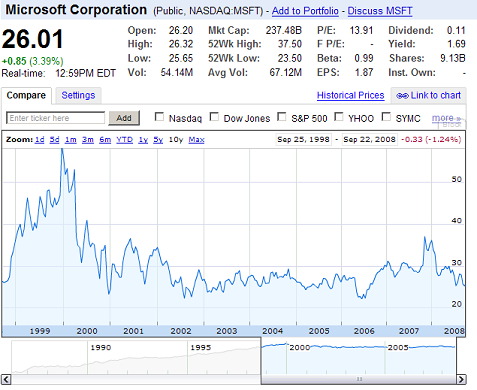On a down day on the market, Microsoft is up today, demonstrating a neat piece of market finance theory. Microsoft is up because they announced they’ll be giving back to shareholders a whole whack of money, 40Billion in share buybacks and an increased dividend rate. Theoretically speaking, share buybacks are functionally equivalent ways to return money to shareholders.
And so the stock is up. But here’s the kicker, MSFT is only paying shareholders their own money. Notionally, the market cap of the firm should stay the same or go down proportionate to the same value of money shifted from one pocket to the other.
Implicitly the market is saying that it believes the same 40B is worth more (Worth 6.75B more to be exact) outside of the hands of Microsoft management than in it. This effect is not actually not uncommon. The market has a tendency to discount the value of large cash balances do to the uncertainty and agency cost/risk of what management might do with it. Empirically studies have shown that firms with higher dividend payout ratios outperform those with lower dividends even if it means they have to go back to the market more often to raise funds for projects (increasing the transparency and accountability of management to market or so the theory goes).
Microsoft could have spent that cash buying up a thousand great startups. They could invest it inventing the next wildly successful ipod, xbox, web OS or they could blow it on the next Vista, Zune or Windows Bob. You just don’t know. That’s the theory anyway.
If Google or Apple gave back 40B to shareholders do you think their stock’s would go up or down?
In the 90’s MSFT minted many millionaires, but this century has got to have been a frustrating ride for employees and shareholders. The stock is still where it was in 1998. In some ways, it’s just hard being a big company. Every year they make piles more money, but only just enough to keep up with the market’s ever-diminishing level of growth expectations (as expressed by an ever diminishing PE multiple). If MSFT was trading at the same multiple as google, today the stock would be over 50.
Microsoft graciously invited me to a big event next month in LA, possibly including sneak peak at Windows 7 and a reinvented Microsoft. I’m sorry I’ll have to miss it, one can hope for great things. It’s funny but I can still remember the days (anyone remember the win95 launch?) when Microsoft was cool. With a new OS, a new browser and many other things on the way, it can only be up from here right?


I wonder: how did they settle on $40B? Would they have gained the same 6.75B if they’d given back $30B? would they have gained additional value if they’d given back $50B?
Given the economic hurtlocker that the US is in, I suspect any perception of putting money in people’s hands is likely to be overvalued in the eyes of the receiver (ie the $300 gov’t tax rebates earlier this year).
I wonder: how did they settle on $40B? Would they have gained the same 6.75B if they’d given back $30B? would they have gained additional value if they’d given back $50B?
Given the economic hurtlocker that the US is in, I suspect any perception of putting money in people’s hands is likely to be overvalued in the eyes of the receiver (ie the $300 gov’t tax rebates earlier this year).
Typically a share buyback which takes publicly held shares and returns them to Treasury is a good thing by increasing EPS on the remaining publicly held shares. Treasury shares are technically not owned by anyone.
However it is usually something done to return cash after a large sale for example. In this case, it appears it is being done because as you rightly suggest the company cannot use the cash effectively in any other way, so best investable use of cash is this.
Typically a share buyback which takes publicly held shares and returns them to Treasury is a good thing by increasing EPS on the remaining publicly held shares. Treasury shares are technically not owned by anyone.
However it is usually something done to return cash after a large sale for example. In this case, it appears it is being done because as you rightly suggest the company cannot use the cash effectively in any other way, so best investable use of cash is this.
If this is the same as their other buybacks, the net # of shares will still be higher after the buyback due to the granting of shares (not options, but shares) to employees.
Happened the last few buybacks, don’t see why it wouldn’t happen again.
If this is the same as their other buybacks, the net # of shares will still be higher after the buyback due to the granting of shares (not options, but shares) to employees.
Happened the last few buybacks, don’t see why it wouldn’t happen again.